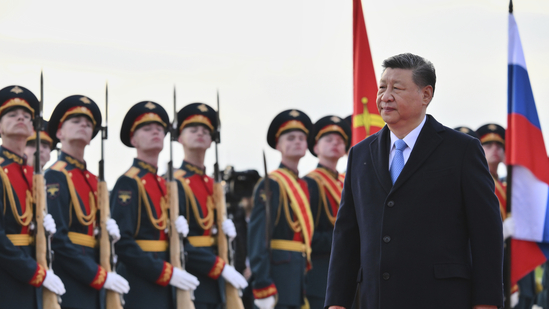Xi calls for preserving the legacy of World War II victory as he arrived in Moscow for a state visit.
Chinese President Xi Jinping on Wednesday emphasized the importance of jointly preserving the legacy of World War II’s victory, warning against the resurgence of hegemonism and power politics in today’s world.
Xi made these remarks upon arriving in Moscow for a state visit and to participate in commemorative events marking the 80th anniversary of the Soviet Union’s triumph in the Great Patriotic War.
In a statement released upon his arrival, Xi affirmed that China and Russia are committed to defending the outcomes of WWII and standing firmly against any form of hegemonic behavior or coercive power plays.
As two influential nations and permanent members of the UN Security Council, Xi stated, China and Russia will collaborate to uphold a UN-centered international order based on international law, support true multilateralism, and promote a more just global governance system.
This visit, made at the invitation of Russian President Vladimir Putin, is Xi’s 11th trip to Russia since assuming the Chinese presidency.
During the visit, Xi is expected to engage in in-depth discussions with Putin on strengthening bilateral ties and addressing major global and regional challenges of mutual concern.
According to China’s Foreign Ministry, attending the celebrations commemorating the 80th anniversary of the Soviet victory is a key component of Xi’s agenda. It will be his second time joining Russia’s Victory Day events on May 9 as Chinese president.
A large military parade is scheduled in Moscow’s Red Square. The city is adorned with flags reading “Victory,” along with billboards and decorative displays recalling the Soviet war effort.
On May 8, 1945, Germany signed its surrender in Berlin, ending WWII in Europe. Due to the time difference, Moscow marked this victory on May 9, now observed as “Victory Day” in Russia.
Simultaneously, in Asia, China was concluding its final major offensive against Japan — the Battle of Western Hunan. Japan formally surrendered on September 2, 1945, aboard the USS Missouri, ending the war globally.
In a signed article published in Russia’s Rossiyskaya Gazeta prior to his visit, Xi urged the global community to maintain an accurate understanding of WWII history.
He noted that China and the Soviet Union were the primary battlegrounds in Asia and Europe respectively, playing a crucial role in defeating Japanese militarism and German Nazism.
Xi warned that any attempts to rewrite the history of WWII, downplay its outcomes, or ignore the contributions of China and the Soviet Union are bound to fail.
The year 2025 will also mark the 80th anniversary of the founding of the United Nations, an institution established in the aftermath of WWII. The UN Charter opens with a solemn vow to shield future generations from the horrors of war.
With the rise of unilateralism, hegemonic ambitions, and bullying in international affairs, Xi stressed the need to reinforce multilateralism and preserve the authority of the United Nations.
Xi’s views were echoed by Russian experts. Ekaterina Zaklyazminskaya of the Russian Academy of Sciences said the UN-based international system is a hard-won achievement that must be protected.
She noted that both China and Russia are champions of authentic multilateralism, which is especially critical in current times.
Alexey Rodionov, a professor of Chinese studies in St. Petersburg, said the world is inevitably moving toward multipolarity, with Russia and China playing vital roles in shaping this transition.
He added that China’s measured and balanced approach to global issues has earned it increasing recognition as a key player in global diplomacy and governance.
Related Posts

















